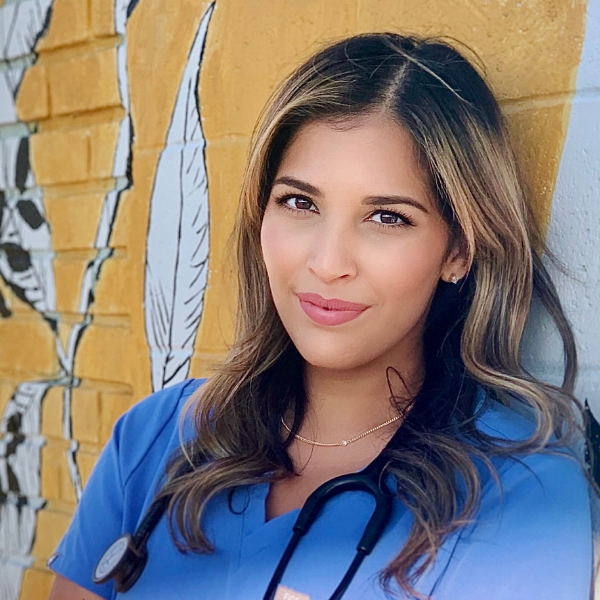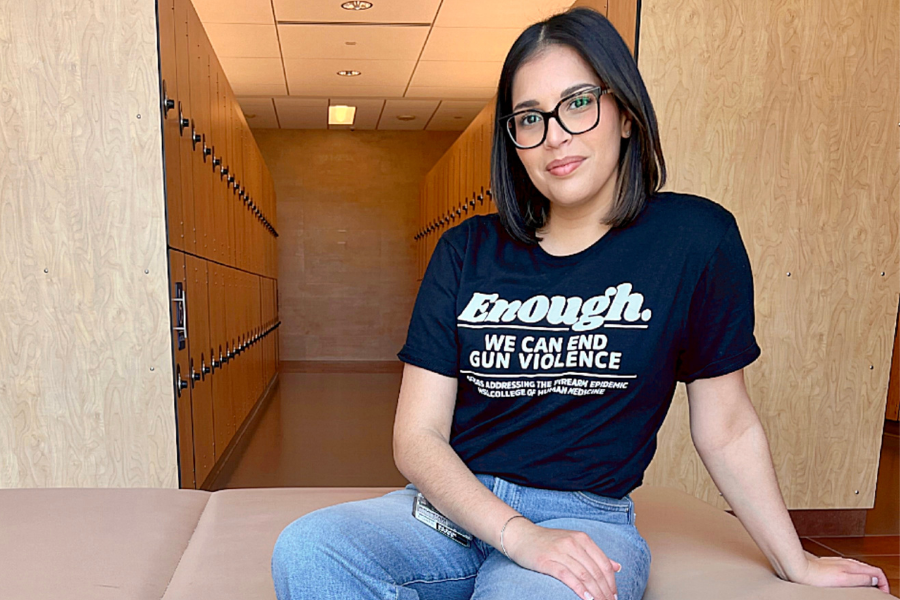Medical Student Confronts Firearm Epidemic with Prevention, Advocacy and Curriculum Changes
August 11, 2023
The following story refers to sensitive details regarding the violence our community experienced on February 13, 2023. The content may be difficult to read. Resources and assistance are available through multiple campus programs.
As the nation grapples with the firearm epidemic, MSU College of Human Medicine students directly impacted by gun violence on their own campus are using their role as future physicians to advocate for change.
 Medical student Jasmanpreet Kaur was wrapping up an online meeting about gun violence when she received a text message: “run, hide, and fight.”
Medical student Jasmanpreet Kaur was wrapping up an online meeting about gun violence when she received a text message: “run, hide, and fight.”
As cofounder of the College of Human Medicine’s Scrubs Addressing the Firearm Epidemic (SAFE) chapter and a former emergency room medical scribe, Kaur was all too familiar with gun violence.
But this was different. It was last Feb. 13, and the tragedy of mass shootings had come to her own school. Three of her fellow Spartans were dead, and five others were wounded.
Although she was 72 miles away in Grand Rapids, Kaur felt her heart race and her stomach churn. “I wanted to move, but I could not,” she later wrote in an essay for SAEM Pulse, a publication by the Society of Academic Emergency Medicine. “The flight or fight response I learned about during my first year of medical school failed me – I instead became paralyzed with fear.”
Paralysis soon gave way to resolve. As a fourth-year College of Human Medicine student who plans to become an emergency room physician, Kaur is determined to do all that she can to reduce gun violence. Her first couple of months at MSU, she and classmate Amanda Schoonover founded the MSU SAFE chapter.
They urged the college to incorporate more information about the epidemic of gun violence in the curriculum.
“Enough is enough,” Kaur said. “This is my time to do something about it. We need to address the number one killer of children.”

She attributes her commitment to how her parents, immigrants from India, raised her and to the teachings of her Sikh faith.
“It was expected that you don’t turn away anyone who needs help,” she said. “Medicine naturally drew me in.”
The month after the MSU shootings, Kaur was in Nashville giving a presentation on how the College of Human Medicine had incorporated firearm safety into its curriculum. A few days later, six people, including three elementary students, were killed in a mass shooting at The Covenant School in Nashville.
“I’m dreading the day when I have to tell someone that their loved one has died because of a gunshot wound,” she said.
While she knows that day is inevitable, she credits her fellow students on the college’s SAFE executive board and MSU faculty and administrators, including Dean Aron Sousa, MD, with supporting efforts to treat gun violence as they would any other epidemic.
She and chapter vice president Ty Sadilek helped organize a letter signed by 732 Michigan medical students urging all members of the state Legislature to:
- Require gun owners to secure their weapons
- Enhance background checks
- Establish a process to prohibit individuals at risk of harming themselves or others from possessing or buying firearms
- Create a method to identify persons prohibited from owning firearms and promptly disarm them
- Fund a threat assessment program to identify students at risk of violence and provide them with an intervention program
Although the campaign will not be easy, Kaur knows that prevention is better than treating a gunshot wound.
“I just feel that as a physician, my responsibility goes beyond the walls of the emergency department,” she said. “This is a passion of mine. It’s a problem, and if we don’t address it as physicians, then no one else will.”

